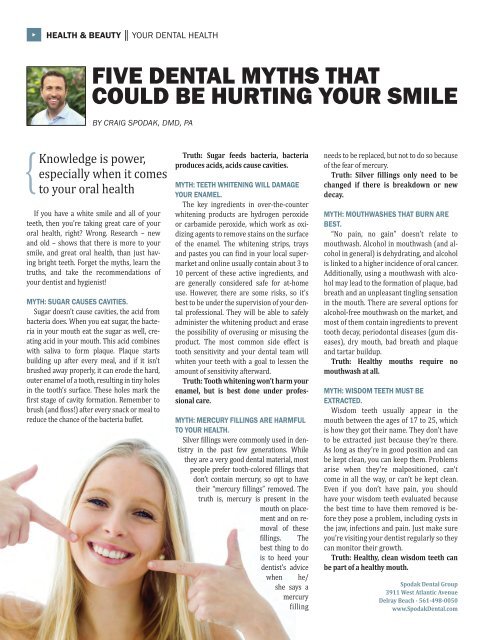You also want an ePaper? Increase the reach of your titles
YUMPU automatically turns print PDFs into web optimized ePapers that Google loves.
►<br />
health & beauty ║ Your Dental Health<br />
Five Dental Myths That<br />
Could Be Hurting Your Smile<br />
BY Craig Spodak, DMD, PA<br />
{<br />
Knowledge is power,<br />
especially when it comes<br />
to your oral health<br />
If you have a white smile and all of your<br />
teeth, then you’re taking great care of your<br />
oral health, right? Wrong. Research – new<br />
and old – shows that there is more to your<br />
smile, and great oral health, than just having<br />
bright teeth. Forget the myths, learn the<br />
truths, and take the recommendations of<br />
your dentist and hygienist!<br />
Myth: Sugar causes cavities.<br />
Sugar doesn’t cause cavities, the acid from<br />
bacteria does. When you eat sugar, the bacteria<br />
in your mouth eat the sugar as well, creating<br />
acid in your mouth. This acid combines<br />
with saliva to form plaque. Plaque starts<br />
building up after every meal, and if it isn’t<br />
brushed away properly, it can erode the hard,<br />
outer enamel of a tooth, resulting in tiny holes<br />
in the tooth’s surface. These holes mark the<br />
first stage of cavity formation. Remember to<br />
brush (and floss!) after every snack or meal to<br />
reduce the chance of the bacteria buffet.<br />
Truth: Sugar feeds bacteria, bacteria<br />
produces acids, acids cause cavities.<br />
Myth: Teeth whitening will damage<br />
your enamel.<br />
The key ingredients in over-the-counter<br />
whitening products are hydrogen peroxide<br />
or carbamide peroxide, which work as oxidizing<br />
agents to remove stains on the surface<br />
of the enamel. The whitening strips, trays<br />
and pastes you can find in your local supermarket<br />
and online usually contain about 3 to<br />
10 percent of these active ingredients, and<br />
are generally considered safe for at-home<br />
use. However, there are some risks, so it’s<br />
best to be under the supervision of your dental<br />
professional. They will be able to safely<br />
administer the whitening product and erase<br />
the possibility of overusing or misusing the<br />
product. The most common side effect is<br />
tooth sensitivity and your dental team will<br />
whiten your teeth with a goal to lessen the<br />
amount of sensitivity afterward.<br />
Truth: Tooth whitening won’t harm your<br />
enamel, but is best done under professional<br />
care.<br />
Myth: Mercury fillings are harmful<br />
to your health.<br />
Silver fillings were commonly used in dentistry<br />
in the past few generations. While<br />
they are a very good dental material, most<br />
people prefer tooth-colored fillings that<br />
don’t contain mercury, so opt to have<br />
their “mercury fillings” removed. The<br />
truth is, mercury is present in the<br />
mouth on placement<br />
and on removal<br />
of these<br />
fillings. The<br />
best thing to do<br />
is to heed your<br />
dentist’s advice<br />
when he/<br />
she says a<br />
mercury<br />
filling<br />
needs to be replaced, but not to do so because<br />
of the fear of mercury.<br />
Truth: Silver fillings only need to be<br />
changed if there is breakdown or new<br />
decay.<br />
Myth: Mouthwashes that burn are<br />
best.<br />
“No pain, no gain” doesn’t relate to<br />
mouthwash. Alcohol in mouthwash (and alcohol<br />
in general) is dehydrating, and alcohol<br />
is linked to a higher incidence of oral cancer.<br />
Additionally, using a mouthwash with alcohol<br />
may lead to the formation of plaque, bad<br />
breath and an unpleasant tingling sensation<br />
in the mouth. There are several options for<br />
alcohol-free mouthwash on the market, and<br />
most of them contain ingredients to prevent<br />
tooth decay, periodontal diseases (gum diseases),<br />
dry mouth, bad breath and plaque<br />
and tartar buildup.<br />
Truth: Healthy mouths require no<br />
mouthwash at all.<br />
Myth: Wisdom teeth must be<br />
extracted.<br />
Wisdom teeth usually appear in the<br />
mouth between the ages of 17 to 25, which<br />
is how they got their name. They don’t have<br />
to be extracted just because they’re there.<br />
As long as they’re in good position and can<br />
be kept clean, you can keep them. Problems<br />
arise when they’re malpositioned, can’t<br />
come in all the way, or can’t be kept clean.<br />
Even if you don’t have pain, you should<br />
have your wisdom teeth evaluated because<br />
the best time to have them removed is before<br />
they pose a problem, including cysts in<br />
the jaw, infections and pain. Just make sure<br />
you’re visiting your dentist regularly so they<br />
can monitor their growth.<br />
Truth: Healthy, clean wisdom teeth can<br />
be part of a healthy mouth.<br />
Spodak Dental Group<br />
3911 West <strong>Atlantic</strong> <strong>Ave</strong>nue<br />
Delray Beach - 561-498-0050<br />
www.SpodakDental.com<br />
54 <strong>March</strong> <strong>2017</strong> | www.<strong>Atlantic</strong><strong>Ave</strong>Magazine.com


















